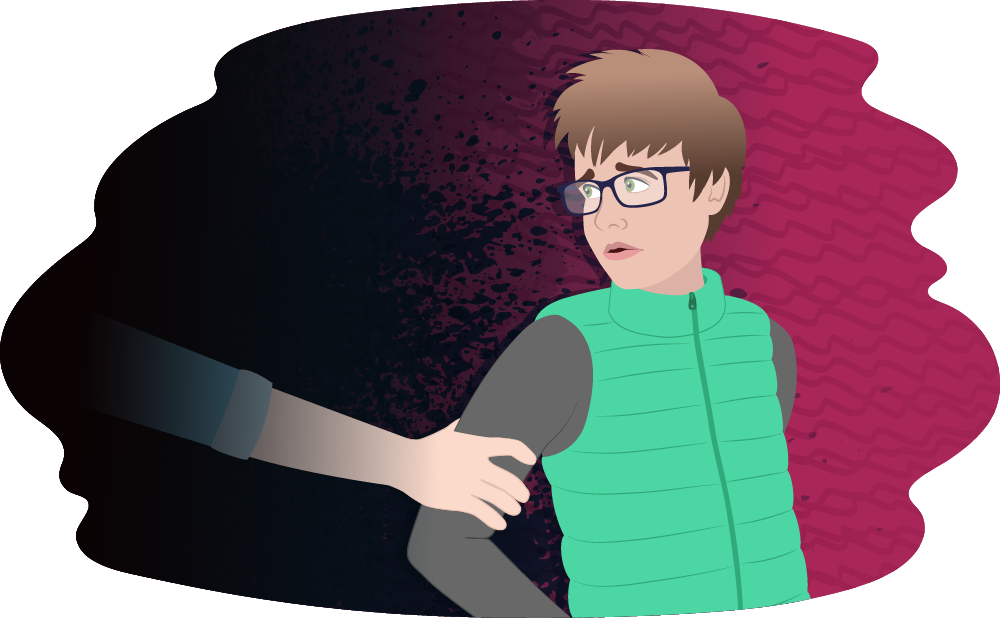Staying safe in an abusive relationship
Being in an abusive relationship can be frightening and confusing. Your safety ...
READ MEIf you’re worried that your friend is in an abusive relationship, it can be hard to know what to do or say. Here’s some information that may help.
Content Warning: this article contains violence and trauma related content that may be triggering or distressing.

Your friend may be in an abusive relationship if their partner engages in some or all of these behaviours:
“People who are being abused may not recognise the risk of violence or might minimise it. They may feel it is all in their head, not as bad as they imagine it to be, or that it’s their own fault.” – Amanda, Kids Helpline Counsellor
People are more likely to confide in a trusted friend for support.
It can be hard to know what to do or say, but here are some things that can help:
Listen openly, without interrupting.
Explore support options – this can help you understand if they have professional supports.
Validate and normalise, e.g. “Talking about this must be really difficult. It’s normal to feel confused.”
Ask questions, e.g. “How are things between you and your partner?”, “I’ve noticed changes in you, like bruises. How did these happen?”
Explain that what they’ve described sounds like an abusive relationship and that this behaviour is not ok, e.g. “It’s not ok you have experienced this and no one deserves to be treated this way.”
Support them to access professional support – you’re not a counsellor and aren’t expected to have all the answers.
If they are safe at the moment, but you have serious concerns about their future safety, contact 1800 RESPECT.
“We can sometimes get caught up in the need to say the ‘right thing’. What you say to your friend doesn’t matter as much as your genuine connection. If in doubt, you can’t go wrong with simply listening and expressing concern.” – Amanda, Kids Helpline Counsellor
Some things can shut down the conversation. Try to avoid doing and saying these things:
Filling in the story/making assumptions, e.g. “Did they kick you?”
Asking too many questions or pressuring for details
Expressing anger at the person doing the abuse
Confronting the person doing the abuse (as this can make things worse)
Making promises you can’t keep, e.g. “I won’t tell anyone.”
Questions or statements that might make them feel they are to blame, such as, “Why didn't you scream for help?”
A person who is being abused can take steps to try to avoid violence, but they cannot stop the violence.
The only person who can stop the violence is the abusive person.
When it comes to violence, they can also choose to harm in ways that aren’t easily visible and don’t always leave marks.
Abuse thrives on secrecy - and people who abuse others go to great lengths to make them keep it secret. Abuse rarely resolves without intervention, as people who abuse want it to be kept secret so they can keep abusing.
If you are supporting a friend who has asked you to keep abuse secret, it can be hard to talk to someone else about it, as you may be worried about betraying their trust. There may also be limits to what professional supports can do if your friend is not willing or able to seek support.
Fortunately, you can seek support anonymously or confidentially, on the best way to support your friend. You can contact Kids Helpline or 1800 RESPECT.
Some people may even experience symptoms of post-traumatic stress disorder as a result of supporting a friend who is unsafe.
Make sure you self-care, practice coping strategies that work for you, and seek support if needed. Your wellbeing is important too!
Staying safe in an abusive relationship
Being in an abusive relationship can be frightening and confusing. Your safety ...
READ MEWhy does abuse happen?
You have a right to be safe. Abusive family relationships are complicated. ...
READ MERevenge porn and image-based abuse
‘Revenge porn’ is a type of image-based abuse that can happen online. ...
READ MEAbuse in adult relationships
Learn about the different forms of abuse in relationships and where to ...
READ METalking helps! We’re here for you.
No problem is too big or too small.
We're here 24 hours a day, 7 days a week